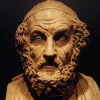No shame in running,
fleeing disaster, even in pitch darkness.
Better to flee from death than feel its grip.[Οὐ γάρ τις νέμεσις φυγέειν κακόν, οὐδ’ ἀνὰ νύκτα.
βέλτερον ὃς φεύγων προφύγῃ κακὸν ἠὲ ἁλώῃ.]Homer (fl. 7th-8th C. BC) Greek author
The Iliad [Ἰλιάς], Book 14, l. 80ff (14.80) [Agamemnon] (c. 750 BC) [tr. Fagles (1990), l. 96ff]
(Source)
Original Greek. Alternate translations:Better from evils, well foreseen, to run
Than perish in the danger we may shun.
[tr. Pope (1715-20)]For there is no disgrace in flying from evil, not even during the night. It is better for a flying man to escape from evil, than to be taken.
[tr. Buckley (1860)]For there is no shame in fleeing from ruin, yea, even in the night. Better doth he fare who flees from trouble, than he that is overtaken.
[tr. Leaf/Lang/Myers (1891)]There is nothing wrong in flying ruin even by night. It is better for a man that he should fly and be saved than be caught and killed.
[tr. Butler (1898)]There is no shame in running, even by night, from disaster.
The man does better who runs from disaster than he who is caught by it.
[tr. Lattimore (1951)]There's no disgrace in getting away from ruin, not by a night retirement. Better a man should leave the worst behind him than be caught.
[tr. Fitzgerald (1974)]

